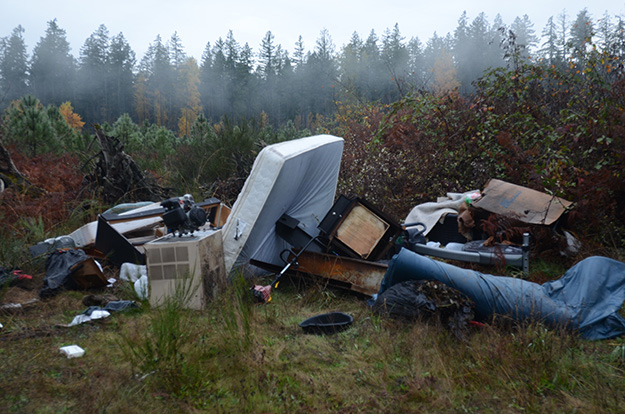JOINT BASE LEWIS-MCCHORD - Over 1,000 service members worked tirelessly during the annual Joint Base Lewis-McChord Fall Clean-up from Nov. 1 to 5 to remove trash from 11 training areas on base as well as the main cantonment areas.
While the obvious purpose of the spring and fall cleanups are to improve the appearance of JBLM, there's a more fundamental reason why these resources are dedicated to this activity.
"While JBLM service members live and work on the installation, we do so as stewards of the land that's been provided to us by the American people for the purpose of supporting our national defense," said Ronald Grantham, operations officer with the Directorate of Plans, Training, Aviation, Mobilization and Security at JBLM. "It's our responsibility to maintain, protect and preserve JBLM for future use by later generations."
Service members spent the week collecting and hauling away more than 139 tons of material from the base training areas and cantonment areas, which included more than 81 tons of trash, more than 21 tons of metal, almost 11 tons of wood, and more than 25 tons of yard waste.
"Most people think we can just put gates around JBLM to solve the problem, but there are so many public main roads surrounding the base that this becomes a challenge," said Grantham.
Over the past 18 months barriers, including large cement blocks and trees, have been placed across the trails leading into many of the training areas to deter illegal trash dumping. JBLM is also working with local law enforcement, in conjunction with its own military police, to increase patrol activity in these areas.
"Soldiers should be able to focus on the mission at hand rather than whether they are going to find hazardous waste or homeless encampments on their patrols in these areas," Grantham said. "We've added these improved security measures to help put an end to the illegal dumping."
An abandoned recreational vehicle, nonworking stoves, lawn mowers, refrigerators, tires, furniture and wood debris are just some of the findings this year.
"I am genuinely surprised at some of the waste that was gathered in the training areas -everything from furniture and car engines to old boats, said U.S. Army Sgt. 1st Class Mansfield Parson, platoon sergeant with 13th Combat Sustainment Support Battalion, 593rd Expeditionary Sustainment Command.
Individuals caught illegally dumping can be fined up to $500 and be required to pay the cost of the clean-up. If hazardous material is involved or the dumper creates an environmental hazard that requires remediation, the clean-up effort can cost thousands.
Not only is trash picked up during the Fall Clean-up, but service members from the 787th Explosive Ordnance Disposal Company, 3rd Explosive Ordnance Disposal Battalion, 555th Engineer Brigade are also responsible for reducing explosive hazards within the artillery impact areas.
This year, the 787th Ordnance Company (EOD) swept over two miles of the artillery impact area along Story Road and covered two other areas within the impact area, that equaled half of a square mile. Between the three areas and over four days, they disposed of over 120 visible unexploded ordnance (UXO) items.
Because of the nature of this task, medical personnel of the 864th Engineer Battalion, 555th Engineer Brigade accompany the EOD team during these range clearances.
U.S. Army Sgt. Demetrius Armstead, health care specialist with 864th Engr. Bn., 555th Engr. Bde. said, "Our job is to maintain the safety of each soldier as they maintain the safety of each field."
According to Grantham, illegal dumping not only harms the environment and costs JBLM lots of money; it also takes away from actual training soldiers need.
For questions about illegal dumping on or near base, call 253-967-3107. When reporting illegal dumping, be prepared to give the location, type of trash and a brief description if possible.





Read Comments